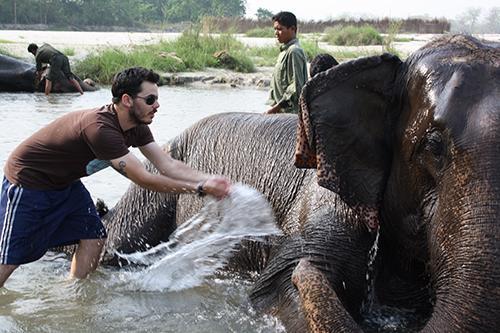
The National Socio-Environmental Synthesis Center (SESYNC) is pleased to welcome our newest Postdoctoral Fellow, Dr. Neil Carter. At SESYNC, Neil’s research will focus on the complexity of protecting biodiversity while simultaneously meeting the resource needs of a growing human population. Focusing on a globally endangered, conservation flagship wildlife species in a global biodiversity hotspot, Neil will explore substantive questions such as:
- To what extent do emergent properties (e.g., feedbacks, non-linearities, thresholds) shape human-environment dynamics? and
- Do some conservation policy scenarios lead to counter-productive outcomes?
Neil received his PhD in Conservation Biology from Michigan State University in summer 2013. His doctoral research evaluated the complex relationships between humans and tigers in and around Chitwan National Park in Nepal. He also holds a MS in Terrestrial Ecology from the University of Michigan and a BS in Ecology from the University of California, San Diego.
Neil can be contacted at ncarter@sesync.org or (410) 919-9144. Read more here.
About SESYNC
The National Socio-Environmental Synthesis Center (SESYNC) is a national research center funded through a National Science Foundation grant to the University of Maryland.
Located in Annapolis, MD, SESYNC is dedicated to solving society’s most challenging and complex environmental problems. We foster collaboration amongst scholars from a diverse array of the natural and social sciences (such as ecology, public health, and political science), as well as stakeholders that include resource managers, policy makers, and community members.
Socio-environmental synthesis is a research approach that accelerates the production of knowledge about the complex interactions between human and natural systems. It may result in new data products—particularly ones that address questions in new spatial or temporal contexts or scales—but may also involve evaluating textual or oral arguments, interpreting evidence, developing new applications or models, or identifying novel areas of study.
Click here to see a list of projects funded by SESYNC.